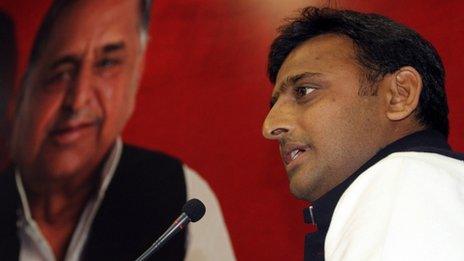Mulayam Singh Yadav: Indian political stalwart dies, aged 82
- Published
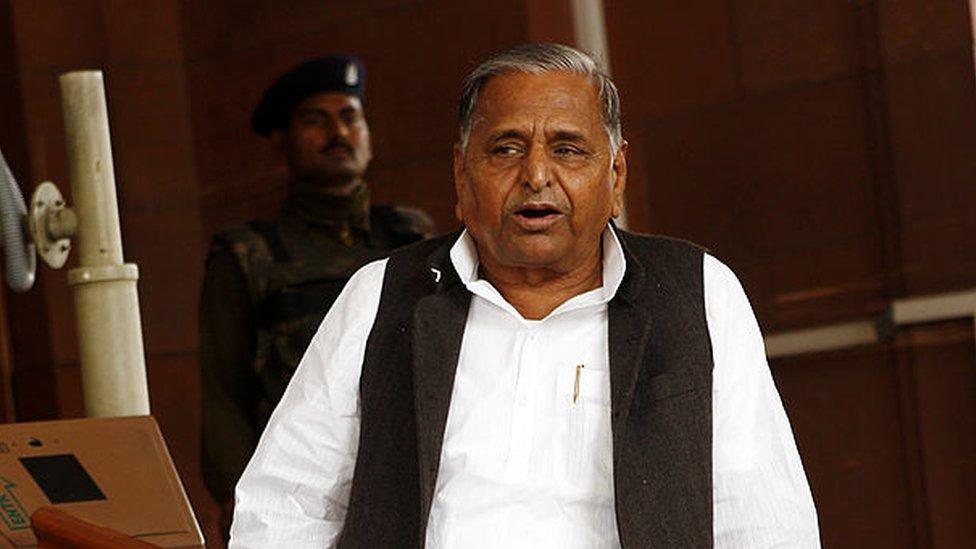
Mulayam Singh Yadav championed the cause of the lower castes and minorities
Veteran Indian politician Mulayam Singh Yadav has died at the age of 82.
The former federal defence minister had been admitted to a private hospital near Delhi more than a fortnight ago.
After his condition deteriorated, he was put on a ventilator. His son and political successor Akhilesh Yadav announced his death on Monday morning.
Politicians from across party lines, public figures and members of the public have paid tributes to one of the stalwarts of Indian politics.
Prime Minister Narendra Modi led the tributes with a tweet, remembering his meetings with the veteran leader.
Allow X content?
This article contains content provided by X. We ask for your permission before anything is loaded, as they may be using cookies and other technologies. You may want to read X’s cookie policy, external and privacy policy, external before accepting. To view this content choose ‘accept and continue’.

India's main opposition Congress party said in a tweet , externalin Hindi that Yadav's "death was an irreparable loss to Indian politics".
Yadav had been unwell for the past few years and was constantly in and out of hospitals. He was a serving MP but was not very active and was rarely seen in public.
His legacy: Samajwadi Party
He leaves a rich and controversial legacy behind as his regional Samajwadi Party (SP), now led by Akhilesh Yadav, continues to be a prominent player in Indian politics.
Mulayam Singh Yadav belonged to a generation of leaders who were born out of mass movements. He was known as a master strategist and his political moves kept both allies and opponents guessing.
He astutely mixed regional and federal politics to remain relevant throughout his active career.
His drive - combined with the skill to bounce back from seemingly hopeless political setbacks - made him a formidable adversary in Uttar Pradesh, India's most populous state.
In his long career, he was the state's chief minister three times and also served as India's defence minister. Like most strong regional leaders, he held the ambition to become India's prime minister, but that dream remained unfulfilled.
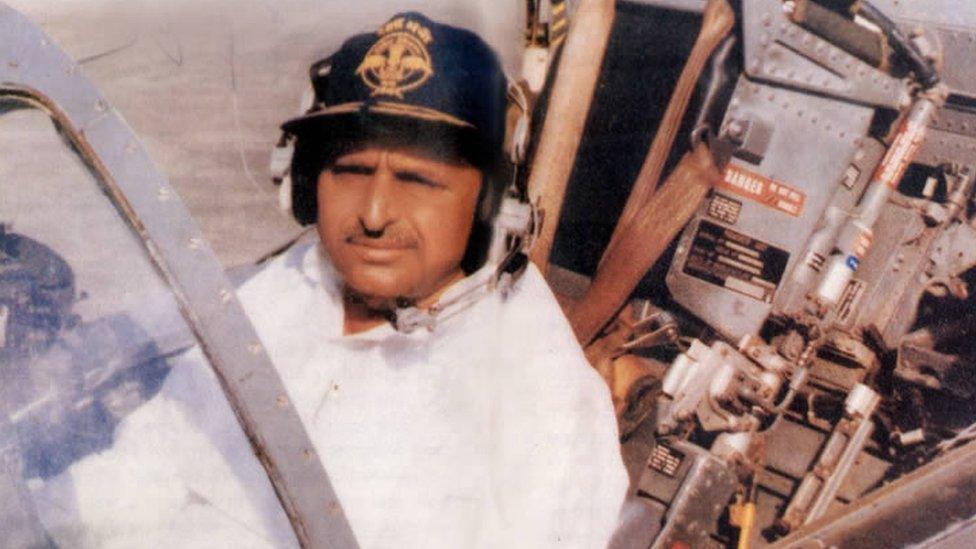
Yadav served as the defence minister of India from 1996 to 1998
Since a bitter rift between his brother Shivpal Yadav and his son divided his Samajwadi Party in 2017, he largely remained away from the limelight. Although he was not in good health in recent years, he remained an elected MP from the state.
Akhilesh Yadav is now the party's undisputed leader at a time when regional parties are reworking their political calculations to account for the Bharatiya Janata Party's (BJP) popularity and undefeated streak in many states, including Uttar Pradesh.
A former wrestler, Mulayam Singh Yadav was known to pin his political opponents down with his understanding of grassroots politics and his ability to connect with the masses. At the same time, he had friends in most political parties.
But he was also prone to political gaffes. While campaigning for the 2014 general elections, he advocated that those accused of rape should not be hanged as "boys make mistakes". He later clarified that he was actually asking for anti-rape laws to be applied judiciously. But his clarification did not stop campaigners from criticising him and questioning his stand on women's rights.
Mass leader
Trained as a teacher in his home village in central Uttar Pradesh, he took the plunge into politics at the age of 15. Influenced by the writings of well-known socialist Ram Manohar Lohia, he took part in several movements led by this ideologue.
In his early career, the former chief minister championed the cause of the lower castes and minorities who still form the bedrock of his party's support.
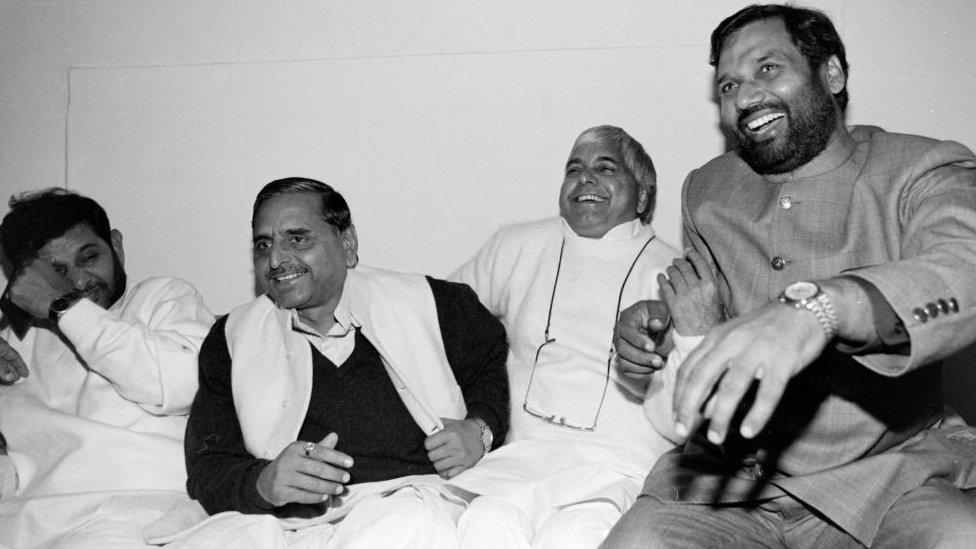
Yadav was elected president of the Janata Dal party in 1980
He became the youngest member of the state assembly when he contested elections in 1967 for a socialist party. He was elected in 1974 and again in 1977, when he romped home, still as a fervent socialist, but representing a different party.
Typical of the mercurial nature of his career were the elections of 1980 when, for the first time, he lost amid a surge of support for the Congress party.
But he still managed to be inducted in the upper house of the state legislature where he promptly rose to become leader of the opposition.
A few years later he took the unusual step of getting elected to the lower house of the state legislature as well - thereby achieving the distinction of being the only leader to have held the position of leader of the opposition in both houses.
His first stint as chief minister in Uttar Pradesh - from 1989 to 1991 - was short lived but not uneventful. It culminated in his party formally separating from Congress, whose support it depended upon.
Risk-taker
What cost him dear in the 1991 elections was his decision in October 1990 to order security forces at the Ayodhya mosque to fire upon mostly Hindu protesters who claimed that the mosque had been built on top of a Hindu temple.
His actions during the stand-off displeased Hindus and Muslims alike - the former accused him of being excessively heavy-handed while the latter said he did not do enough to stop Hindu mobs going on the rampage.
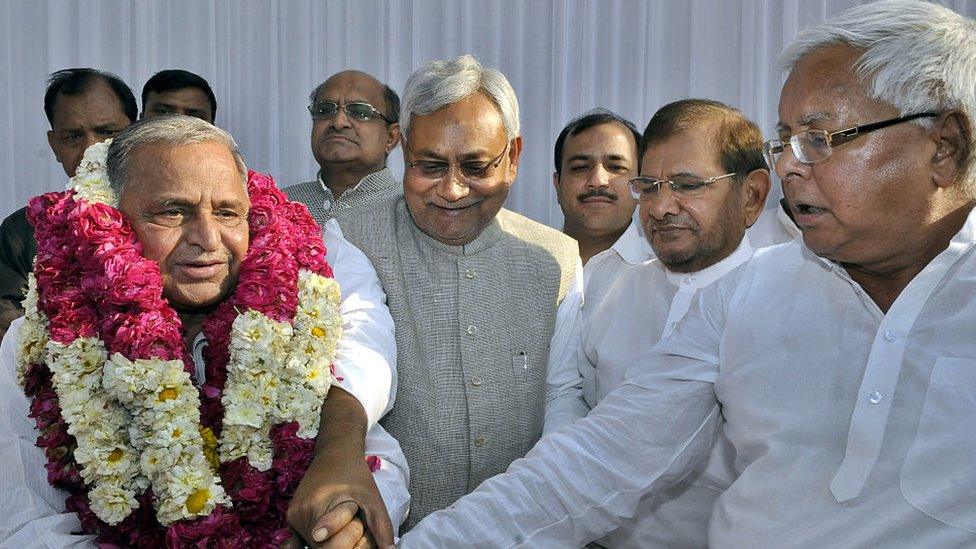
During his political career, Yadav has befriended and been at loggerheads with a wide spectrum of Indian parties
It was only when the mosque was pulled down in December 1992 that Yadav emerged as a hero among Muslims, who then credited him for saving the shrine in 1990.
After the 1994 elections, following a prolonged period of presidential rule in Uttar Pradesh, Yadav found himself back in power - this time with the support of a new ally, the Bahujan Samaj Party (BSP).
But it was a relationship that did not last long. In June 1995, BSP leader Mayawati pulled the rug from under his feet and upstaged him to become chief minister herself with the support of the Hindu nationalist BJP.
Mr Yadav's humiliation at the hands of Mayawati was hard for him to swallow, but his time in the political wilderness was short-lived.
Ambitions to become PM
In the summer of 1996, he won his first break in central politics when he was appointed India's defence minister in a United Front coalition government, which was led by HD Dewe Gowda.
Ambitious as ever, at one point Yadav even tried to become prime minister, but he always lacked a strong support base despite being at the centre of ceaseless political intrigue.
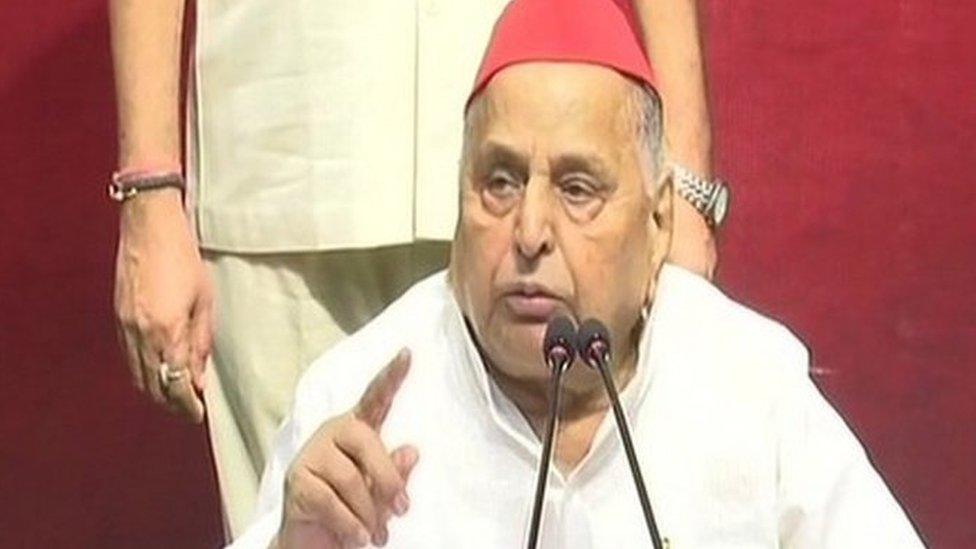
Yadav served as the chief minister of Uttar Pradesh three times
Evidence of this was clearly seen when he took the decision to oppose Sonia Gandhi's candidature for prime minister after the fall of the 13-day government of BJP leader Atal Behari Vajpayee in 1996.
Yadav described her as a "videshi" (foreigner) - a mistake that came back to haunt him when Mrs Gandhi and Congress refused to support him when he needed it while trying to form a government in Uttar Pradesh as the single largest party following polls in February 2002.
This meant his arch-rival Mayawati was able to seize the moment instead.
As on previous occasions, he did not allow this setback to linger - he returned as chief minister for the third time in 2003 and held the post until assembly elections in May 2007 when he again lost to Mayawati.
Akhilesh Yadav is successor
For the 2012 elections, he again cultivated political alliances - this time with a breakaway leader of the BJP.
The move was dangerous because it could have damaged his Muslim vote bank as the BJP is loathed by many Muslims in Uttar Pradesh for its role in the Ayodhya dispute. But his faith paid off and his party won an absolute majority.
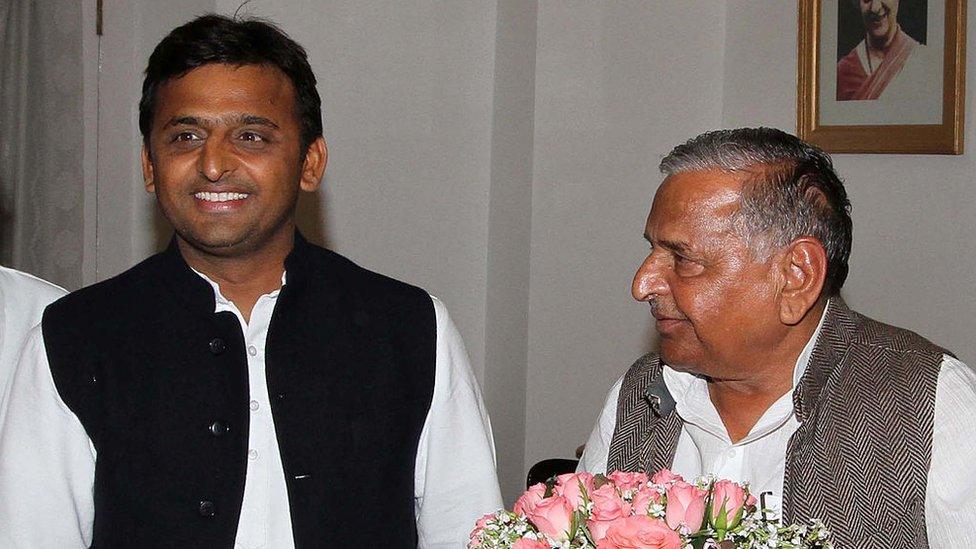
After the 2012 elections, Mulayam Singh Yadav stepped aside in favour of his eldest son Akhilesh Yadav (left)
But he had to step aside in favour of his eldest son Akhilesh Yadav who was largely credited for the party's success by tirelessly campaigning around the state. Yadav senior read the mood on the ground and knew that the youth were rallying behind his son.
Everything went smoothly until 2017 when he first expelled his son from the party for "not listening to his advice", only to reverse his decision later to back him. This left his brother Shivpal Yadav in the political wilderness.
However, the open display of the rift was among the main reasons that cost his son and his party the elections, allowing the BJP to win a landslide.
The way he handled the family drama only reinforced his image of an unpredictable politician who, at different stages of his career, was politically in bed - and at loggerheads - with a wide spectrum of Indian parties.
But in another move that surprised even his closest allies, he approved his son's decision to form an alliance with Mayawati - the politician he fought most of his life - in 2019. He not only endorsed the alliance but also appeared on the stage with Mayawati and Akhilesh.
This was perhaps one of the many contradictions of the man who knew how to stay relevant, even if it meant taking some hard and unexpected decisions.
But the coalition lost the polls to the BJP. He never managed to emerge from the shadow of this defeat and largely stayed on the sidelines of Indian politics until his death.

Read more India stories from the BBC:

- Published3 January 2017
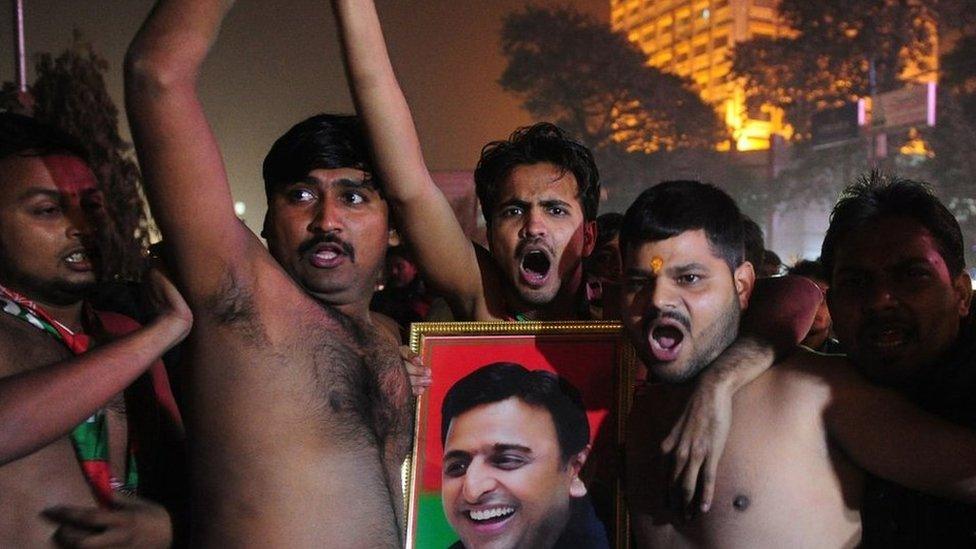
- Published15 March 2012
